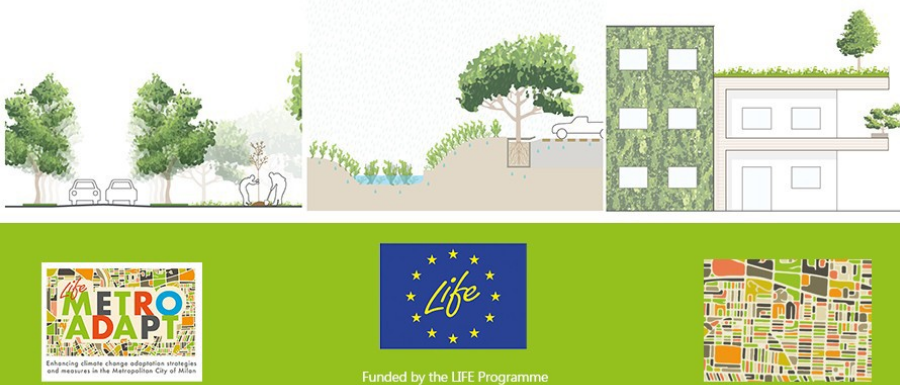One of the main strategies that a metropolitan area can implement to improve the effectiveness of climate change adaptation measures is the design and development of the so-called Nature-Based Solutions.
Nature-Based Solutions (NBS) are interventions inspired and supported by Nature that guarantee environmental, social and economic benefits, contributing to improving climate change adaptation in urban areas and increasing territorial resilience. These are hence cost-effective solutions that contribute to biodiversity defense, species conservation, sustainable energy production, waste management and social cohesion, among others. The main types of NBS that are applicable to the urban context concern are water management, green on built environment and ground green spaces.
Within the Metro Adapt project, co-funded by the LIFE Programme of the European Union, a catalogue of 20 NBS has been produced to illustrate the solutions that can be implemented in urban and peri-urban areas, specifying their scale of application, describing their environmental and socio-economic benefits, the advantages and disadvantages and providing examples of good practices.
Furthermore, the LIFE Metro Adapt project developed some guidelines directed to public administrations in order to provide them with useful knowledge for NBS implementation, to foster a better management of water resources and the mitigation of the heat island effect. The guidelines identify four different types of tools that can be used by local entities:
- strategies and plans;
- cognitive tools;
- regulations and technical guidelines;
- public-private agreements.
The full document is available HERE.
Life Metro Adapt – enhancing climate change adaptation strategies and measures in the metropolitan City of Milan is an EU project funded by the Programme for the Environment and Climate Action (LIFE) that involves six partners and aims at fostering the creation of a common well-structured governance related to climate change adaptation among the local authorities of the Metropolitan Area of Milan; and to produce tools that allow local authorities to implement cost-effective climate change adaptation strategies and policies adapted to the local context.
One of the main strategies that a metropolitan area can implement to improve the effectiveness of climate change adaptation measures is the design and development of the so-called Nature-Based Solutions.
Nature-Based Solutions (NBS) are interventions inspired and supported by Nature that guarantee environmental, social and economic benefits, contributing to improving climate change adaptation in urban areas and increasing territorial resilience. These are hence cost-effective solutions that contribute to biodiversity defense, species conservation, sustainable energy production, waste management and social cohesion, among others. The main types of NBS that are applicable to the urban context concern are water management, green on built environment and ground green spaces.
Within the Metro Adapt project, co-funded by the LIFE Programme of the European Union, a catalogue of 20 NBS has been produced to illustrate the solutions that can be implemented in urban and peri-urban areas, specifying their scale of application, describing their environmental and socio-economic benefits, the advantages and disadvantages and providing examples of good practices.
Furthermore, the LIFE Metro Adapt project developed some guidelines directed to public administrations in order to provide them with useful knowledge for NBS implementation, to foster a better management of water resources and the mitigation of the heat island effect. The guidelines identify four different types of tools that can be used by local entities:
- strategies and plans;
- cognitive tools;
- regulations and technical guidelines;
- public-private agreements.
The full document is available HERE.
Life Metro Adapt – enhancing climate change adaptation strategies and measures in the metropolitan City of Milan is an EU project funded by the Programme for the Environment and Climate Action (LIFE) that involves six partners and aims at fostering the creation of a common well-structured governance related to climate change adaptation among the local authorities of the Metropolitan Area of Milan; and to produce tools that allow local authorities to implement cost-effective climate change adaptation strategies and policies adapted to the local context.
